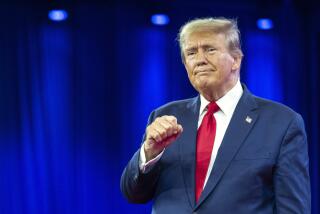Iraqi panel voids candidacies of 52 substitutes in March vote
Reporting from Baghdad —
The U.S. ambassador warned Monday that formation of Iraq’s new government was lagging, as a judicial panel banned at least one elected candidate from office on grounds that he had belonged to Saddam Hussein’s party and threw out the votes for 51 others.
The 52 had been last-minute substitutes for other candidates, who also had been barred from running in the March 7 elections due to their alleged connections to the former ruling Baath Party.
Just days before the vote, the country’s Accountability and Justice Commission, which screens candidates for ties to the Baath Party, announced the names of the 52 substitute candidates who it said should be banned. But Iraq’s electoral commission ruled that their cases would be decided after the balloting.
A three-judge panel on Monday threw out their candidacies, a move that could further polarize the political process.
“We are concerned that the process is lagging, and that we have not gotten onto the government formation as yet,” U.S. Ambassador Christopher Hill told reporters. “It seems to me that it’s time to get this show on the road here.”
At least one of the substitute candidates, Ibrahim Mutlak, had been elected to parliament representing the Iraqiya alliance in place of his brother, Saleh Mutlak, a prominent Sunni Arab who had been banned from running. Iraqiya is headed by former Prime Minister Iyad Allawi, a secular Shiite Muslim. It won 91 seats in parliament, compared with 89 for Prime Minister Nouri Maliki’s Shiite-dominated State of Law list.
An additional 21 candidates who were banned Monday but had not won election also belonged to Iraqiya, officials said.
It was unclear whether the judges’ decision would affect the division of seats in parliament. The other candidates who were banned belonged to other parties and also failed to win election.
The fate of nine additional candidates who were elected to parliament is to be decided in coming days, Iraqi officials said. Most of those candidates are affiliated with Iraqiya. They were accused of having been Baath members after the election results were announced.
The parties are also waiting for the country’s electoral commission to start its recount of votes in Baghdad, which was ordered last week. The call for a recount has raised concerns that the vote will lose legitimacy in the eyes of Iraq’s Shiite majority or Sunnis, who were favored under the Baath regime.
It could also lead to calls to hold recounts in other provinces. The United Nations and U.S. Embassy have said they regard the elections as fair, with no evidence of systematic fraud. The commission hopes to announce the procedures for the Baghdad recount in the coming few days, with a goal to begin the recount next week.
Allawi has vowed to fight the ban on candidates from his alliance. “We have instructed lawyers to appeal against the panel’s decision,” Allawi said in Ankara, the Turkish capital.
The controversy comes as talks between Maliki’s alliance and the other main Shiite-led coalition, the Iraqi National Alliance, have reached a stalemate. Neither are there any signs of progress in talks between Allawi’s list and Maliki’s. Violence is on the rise, including a string of bombings against Shiite neighborhoods in Baghdad on Friday.
Shiite politician Mowaffak Rubaie expressed worry about the impasse after a meeting with Grand Ayatollah Ali Sistani, Iraq’s most respected Shiite religious leader, in the holy city of Najaf.
“We revealed to the marjaiyah [senior clergy] the latest political developments and conveyed our worries about ceasing of the deliberations between the winning slates,” said Rubaie, a member of the Iraqi National Alliance, which finished third in the vote.
“We expressed our beliefs that the absence of progress and keeping the situation as it is will contribute in a direct way [to] encouraging terrorism.”
More to Read
Sign up for Essential California
The most important California stories and recommendations in your inbox every morning.
You may occasionally receive promotional content from the Los Angeles Times.










